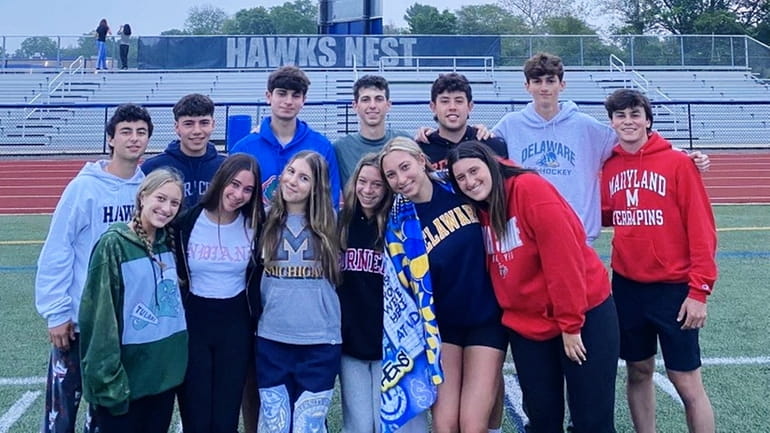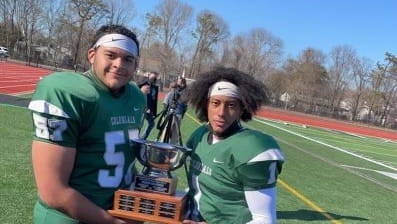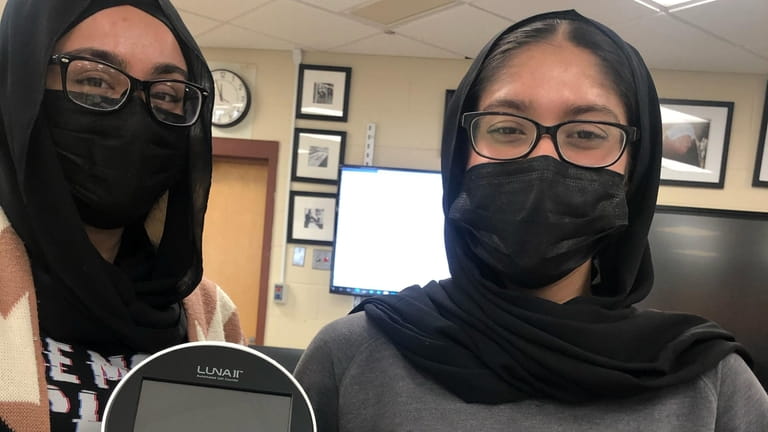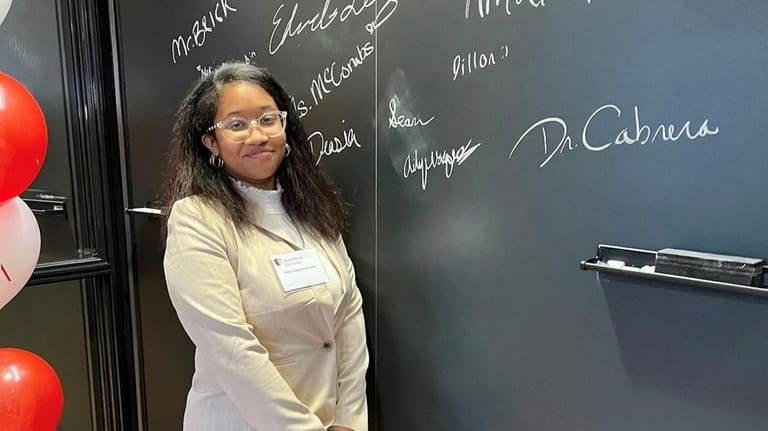The pandemic class: Long Island's 2023 graduating seniors on how COVID-19 bookended their high school experience

Seniors from Plainview-Old Bethpage John F. Kennedy High School gathered for their annual Senior Sunrise at the school on June 12. Credit: Zachary Zutler
Zachary Zutler is a member of the Class of 2023. But you might also say he and his fellow high school graduates across Long Island are also the Class of COVID-19.
Their four years of high school were bookended by the beginning and the end of the pandemic. Zutler, 18, a senior at Plainview-Old Bethpage John F. Kennedy High School, remembers learning of the quarantine’s start when he was a freshman at an after-school lacrosse practice, and last month the World Health Organization declared the pandemic over as Zutler and his classmates anticipated their march to “Pomp and Circumstance.”
“This year was probably the first completely normal year,” Zutler says of his high school experience. “It felt like everything was like it was supposed to be.” That wasn’t the case for his first three years. Seniors across Long Island share what it was like to live through history while also coming of age.
“Being able to start high school with a normal world, I had a great time,” says Jae Kim, 17, senior class council president at William Floyd High School in Mastic Beach. “Up until the pandemic, I met so many new people.”
But when quarantine hit in March of 2020, “it was such a shock to everyone,” says Corey Wong, 17, valedictorian of Mount Sinai High School.
At first, students were excited — two weeks off! “We can go home and do whatever we want. Teachers weren’t prepared, so they didn’t send us home with much work,” says Minnahil Tariq, 17, a senior at Brentwood High School. “The news of COVID and its effect weren’t bad, fear of the virus didn’t really set in yet. Especially as kids — we were only 13, 14 back then.”
But as the pandemic surged on, “it was really hard to be pulled away from our friends and our teachers,” Zutler says. “It was very surreal and confusing at the time.” Cellphones became students’ main lifelines, students say.
“I lost a lot of interest in the school clubs and activities I was in,” says Alyssa Williams, 17, co-student senate president at West Islip High. “I kind of just gave up on high school. I went through a period where I didn’t do any homework. My grades got pretty bad at the end of freshman year.”
That summer after freshman year was also a dud, they say. Zutler says he missed his last summer at sleepaway camp before he aged out of the program there.
Sophomore year was the toughest, students say, both academically and socially.
Many schools employed a hybrid schedule. For instance, sophomores whose last names started with A through K went to school on Mondays and Wednesdays, and sophomores whose last names started with L through Z went to school Tuesdays and Thursdays. When they weren’t physically in school students attended the class virtually.
“That was probably just as hard as being online,” Zutler says. “Me being a Z, I was away from all my friends with names higher in the alphabet.”
Says Wong: “You had to wake up and remember if you were even going to school that day.”
If you played a sport, and there was after-school practice, you had to figure out how to get to school in the afternoon, says David Ramirez, 17, a senior at Brentwood High School who played on the tennis team.
The alternate days spent at home had too many distractions to allow for academic focus, Ramirez says. “From cellphones to siblings,” Ramirez says. “There was no teacher watching over you specifically, since we didn’t have our cameras on in some classes.”
Williams says her grades continued to suffer because she had fallen into bad academic habits. “I definitely had no drive,” she says.
Ailyn Vasquez, 18, a senior at Brentwood High School, echoes Williams. “Just kind of sleeping a lot, sleeping in a lot … being kind of bored,” she says. Other students say they remember just lying in their beds listening to class.
“That definitely affected us, our brain chemistry,” Kim says of going to school online. For him, though, the change was a positive. “Having everything online in a digital age made me more organized and allowed me to get my work done much faster,” Kim says.
Readjustment socially wasn’t easy after being home for so long, some students say. “I was already socially anxious. Once I came back to school sophomore year, it was really hard to reconnect,” Vasquez says. “Especially because people had masks on, you couldn’t see people.”
Many social and club activities were on screens or canceled altogether. “We got one pep rally our entire years of high school,” says Rose Fernandez, 18, president of the senior class at Newfield High School in Selden.
It was sad to have big events canceled, Williams says. For instance, during freshman year spirit week at West Islip High School, each class decorated a hallway. "It was so much fun, the hallways were beautiful. We didn't do it in 10th grade," she says.
Many schools had the entire student body back full time in person. Getting back into the groove of a physical and mental routine was tough, Fernandez says. So was continuing to wear masks, which were required all day for the majority of the academic year. “Our mouths were literally covered up,” she says.
“Junior year was still a little — how do I put this? It was still weird going back after two years that just weren’t normal years,” Ramirez agrees.
COVID-19 still hovered over everything early in the school year. It affected, for instance, attendance at school and events when people tested positive. LaDuke Harris Jr., 17, then the quarterback of the William Floyd High School football team, says he got the virus in the days leading up to the "Battle of the Parkway" annual rivalry game against Longwood High School in Middle Island and had to miss it due to the need to quarantine for 10 days. "I was really excited about that game," he says.
Eventually, the virus seemed to recede and masks were no longer needed. “It was nice to see everybody’s faces again,” Zutler says.
Williams says she started to pull her grades up when “going back to a regular schedule where I was held a little bit more accountable. Junior year gave me a boost for college.” She got involved in the student senate.
By the end of the year, events came back in full, and some were even better than they'd been in the past, Fernandez says. For instance, Newfield High School's junior prom had always been held in the school gym, but their class was able to have the event at a venue instead. Now future classes will also have that option, she says.
One positive outcome of the pandemic, Vasquez says, is that people now prioritize mental health more after being isolated and seeing people experience depression and anxiety. “We came out of this being more open minded … about mental illness and its effects. I think it makes us a better society,” she says.
“For our senior year, we were able to come back together and have a normal senior high school experience, which was very rewarding after the past three years we’d gone through. We were able to have the same trips we were supposed to, different competitions. We had our Senior Week where we went to our elementary and middle shcools to wear our cap and gowns and see our teachers.
"Being able to spend our final day in high school together, we got together for the final bell. This coming week we're looking forward to being about to have graduation back in its normal place,” says Zutler, who will attend the University of Georgia. Students are happy and grateful for the chance at least to experience their final milestones together without limitations, he says.
As for the other years of the pandemic: “It definitely had a huge impact on how my high school career played out. I wouldn’t say that it ruined it, but I definitely wish things went differently,” Williams says. Her emotions during the pandemic contributed to her decision to study psychological sciences at the University of Connecticut, she says.
“It taught us to overcome any adversities that we face and taught us to adapt, and showed us how powerful we really are,” points out Kim, who plans to study political science at Binghamton University before moving to a program at Boston University.
“I think that most of the students I went to high school with the past four years can all agree with what I’m about to say: It was very difficult,” says Fernandez, who will attend SUNY Albany and study childhood education. “We should really give ourselves a pat on the back.”
Zachary Zutler is a member of the Class of 2023. But you might also say he and his fellow high school graduates across Long Island are also the Class of COVID-19.
Their four years of high school were bookended by the beginning and the end of the pandemic. Zutler, 18, a senior at Plainview-Old Bethpage John F. Kennedy High School, remembers learning of the quarantine’s start when he was a freshman at an after-school lacrosse practice, and last month the World Health Organization declared the pandemic over as Zutler and his classmates anticipated their march to “Pomp and Circumstance.”
“This year was probably the first completely normal year,” Zutler says of his high school experience. “It felt like everything was like it was supposed to be.” That wasn’t the case for his first three years. Seniors across Long Island share what it was like to live through history while also coming of age.
Freshman year, 2019 to 2020
“Being able to start high school with a normal world, I had a great time,” says Jae Kim, 17, senior class council president at William Floyd High School in Mastic Beach. “Up until the pandemic, I met so many new people.”
But when quarantine hit in March of 2020, “it was such a shock to everyone,” says Corey Wong, 17, valedictorian of Mount Sinai High School.
At first, students were excited — two weeks off! “We can go home and do whatever we want. Teachers weren’t prepared, so they didn’t send us home with much work,” says Minnahil Tariq, 17, a senior at Brentwood High School. “The news of COVID and its effect weren’t bad, fear of the virus didn’t really set in yet. Especially as kids — we were only 13, 14 back then.”
But as the pandemic surged on, “it was really hard to be pulled away from our friends and our teachers,” Zutler says. “It was very surreal and confusing at the time.” Cellphones became students’ main lifelines, students say.
“I lost a lot of interest in the school clubs and activities I was in,” says Alyssa Williams, 17, co-student senate president at West Islip High. “I kind of just gave up on high school. I went through a period where I didn’t do any homework. My grades got pretty bad at the end of freshman year.”
That summer after freshman year was also a dud, they say. Zutler says he missed his last summer at sleepaway camp before he aged out of the program there.
Sophomore year, 2020 to 2021

Isaiah Sadler, now 19, and LaDuke Harris Jr., now 17, two years ago at the annual “Battle of the Parkway” football game, when Sadler was a senior and Harris a sophomore. Harris had to miss the game junior year because he was quarantining after testing positive for COVID-19. Credit: LaDuke Harris Jr.
Sophomore year was the toughest, students say, both academically and socially.
Many schools employed a hybrid schedule. For instance, sophomores whose last names started with A through K went to school on Mondays and Wednesdays, and sophomores whose last names started with L through Z went to school Tuesdays and Thursdays. When they weren’t physically in school students attended the class virtually.
“That was probably just as hard as being online,” Zutler says. “Me being a Z, I was away from all my friends with names higher in the alphabet.”
Says Wong: “You had to wake up and remember if you were even going to school that day.”
If you played a sport, and there was after-school practice, you had to figure out how to get to school in the afternoon, says David Ramirez, 17, a senior at Brentwood High School who played on the tennis team.
The alternate days spent at home had too many distractions to allow for academic focus, Ramirez says. “From cellphones to siblings,” Ramirez says. “There was no teacher watching over you specifically, since we didn’t have our cameras on in some classes.”
Williams says her grades continued to suffer because she had fallen into bad academic habits. “I definitely had no drive,” she says.
Ailyn Vasquez, 18, a senior at Brentwood High School, echoes Williams. “Just kind of sleeping a lot, sleeping in a lot … being kind of bored,” she says. Other students say they remember just lying in their beds listening to class.
“That definitely affected us, our brain chemistry,” Kim says of going to school online. For him, though, the change was a positive. “Having everything online in a digital age made me more organized and allowed me to get my work done much faster,” Kim says.
Readjustment socially wasn’t easy after being home for so long, some students say. “I was already socially anxious. Once I came back to school sophomore year, it was really hard to reconnect,” Vasquez says. “Especially because people had masks on, you couldn’t see people.”
Many social and club activities were on screens or canceled altogether. “We got one pep rally our entire years of high school,” says Rose Fernandez, 18, president of the senior class at Newfield High School in Selden.
It was sad to have big events canceled, Williams says. For instance, during freshman year spirit week at West Islip High School, each class decorated a hallway. "It was so much fun, the hallways were beautiful. We didn't do it in 10th grade," she says.
Junior year, 2021 to 2022

Minnahil Tariq and Dua Hanif, both seniors at Brentwood High School, pictured in the Research Lab working on a science project during their junior year. Credit: Minnahil Tariq
Many schools had the entire student body back full time in person. Getting back into the groove of a physical and mental routine was tough, Fernandez says. So was continuing to wear masks, which were required all day for the majority of the academic year. “Our mouths were literally covered up,” she says.
“Junior year was still a little — how do I put this? It was still weird going back after two years that just weren’t normal years,” Ramirez agrees.
COVID-19 still hovered over everything early in the school year. It affected, for instance, attendance at school and events when people tested positive. LaDuke Harris Jr., 17, then the quarterback of the William Floyd High School football team, says he got the virus in the days leading up to the "Battle of the Parkway" annual rivalry game against Longwood High School in Middle Island and had to miss it due to the need to quarantine for 10 days. "I was really excited about that game," he says.
Eventually, the virus seemed to recede and masks were no longer needed. “It was nice to see everybody’s faces again,” Zutler says.
Williams says she started to pull her grades up when “going back to a regular schedule where I was held a little bit more accountable. Junior year gave me a boost for college.” She got involved in the student senate.
By the end of the year, events came back in full, and some were even better than they'd been in the past, Fernandez says. For instance, Newfield High School's junior prom had always been held in the school gym, but their class was able to have the event at a venue instead. Now future classes will also have that option, she says.
One positive outcome of the pandemic, Vasquez says, is that people now prioritize mental health more after being isolated and seeing people experience depression and anxiety. “We came out of this being more open minded … about mental illness and its effects. I think it makes us a better society,” she says.
Senior year, 2022 to 2023

Ailyn Vasquez, a senior at Brentwood High School, attends a Simons STEM Scholars program at Stony Brook University during her senior year. Credit: Ailyn Vasquez
“For our senior year, we were able to come back together and have a normal senior high school experience, which was very rewarding after the past three years we’d gone through. We were able to have the same trips we were supposed to, different competitions. We had our Senior Week where we went to our elementary and middle shcools to wear our cap and gowns and see our teachers.
"Being able to spend our final day in high school together, we got together for the final bell. This coming week we're looking forward to being about to have graduation back in its normal place,” says Zutler, who will attend the University of Georgia. Students are happy and grateful for the chance at least to experience their final milestones together without limitations, he says.
As for the other years of the pandemic: “It definitely had a huge impact on how my high school career played out. I wouldn’t say that it ruined it, but I definitely wish things went differently,” Williams says. Her emotions during the pandemic contributed to her decision to study psychological sciences at the University of Connecticut, she says.
“It taught us to overcome any adversities that we face and taught us to adapt, and showed us how powerful we really are,” points out Kim, who plans to study political science at Binghamton University before moving to a program at Boston University.
“I think that most of the students I went to high school with the past four years can all agree with what I’m about to say: It was very difficult,” says Fernandez, who will attend SUNY Albany and study childhood education. “We should really give ourselves a pat on the back.”

